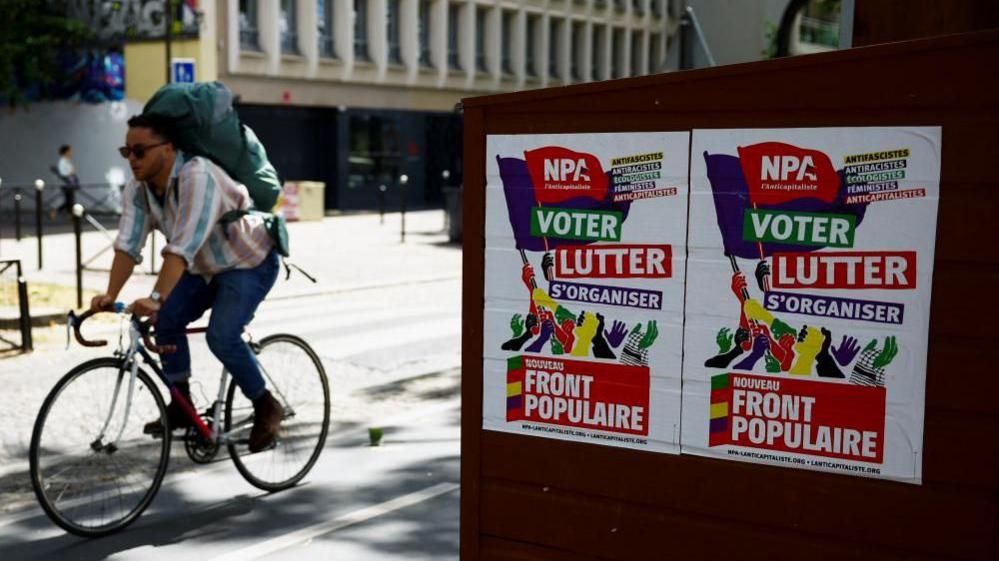Who are the left-wing alliance that won France's election?

- Published
A left-wing coalition that was formed less than a month ago has won a shock victory at the second round of France’s snap parliamentary election.
The New Popular Front (NPF) is a broad church of centre-left and left-wing parties ranging from the Socialists to the Greens, the Communists and the radical left France Unbowed (LFI).
Although these parties have criticised one another in the past and have some key differences in their ideology and approach, they decided to form a bloc to keep the far right out of government when President Emmanuel Macron called an election on 9 June.
The tactic worked. Against every expectation, on Sunday the New Popular Front (NFP) won a total of 182 seats, ahead of President Emmanuel Macron’s centrist Ensemble alliance.
The far-right National Rally, which had come out top in round one a week ago, fell to third place.
The NFP managed such a remarkable comeback thanks to a concerted effort by left wing and centrist parties, which saw candidates withdraw from three-way races in order to concentrate the anti-RN vote. This occurred in around 200 constituencies and changed the outcome of the election.
What happens to the NFP now?
The NFP only arose out of genuine fear by leftist parties that the RN was about to seize power.
Now that scenario has been avoided, the members of the NFP need to find ways to work together in the National Assembly - and rallying together to stop the far right from winning a majority may turn out to have been the easy part.
Cracks began to show shortly after the exit polls were published on Sunday night.
Although NFP party leaders acknowledged the outcome was the result of a joint effort, they each celebrated the result on their own, and some crucial differences in how to approach the post-election phase are already starting to emerge.
Because the NFP did not win an outright majority, some on the left are saying their bloc will have to find support from other parties, like President Macron’s Ensemble alliance.
Raphaël Glucksmann, a centre-left politician who is a rising star within the Socialist Party, has already said opponents will have to come together and make deals, as they do elsewhere in Europe.
Francois Hollande, the former Socialist president of France who has now been elected as an MP, has said the NFP would have to “try, if possible” to form alliances with other groups – although he acknowledged this would be very difficult.
But Jean-Luc Mélenchon, the radical left firebrand leader of France Unbowed (LFI), has ruled out working with President Macron’s camp and has instead called for the NFP to be given the chance to name its own prime minister and to govern on its own.
- Published8 July
- Published8 July
What does the NFP want?
Shortly after they formed a coalition, the NFP put out a programme that included a promise to scrap the pension and immigration reforms passed by the current government, to set up a rescue agency for undocumented migrants and to facilitate visa applications.
The NFP also promised caps on basic goods to combat the cost of living crisis, boost housing subsidies and raise the monthly minimum wage to €1,600 (£1,350).
The alliance said it would finance its increase in social spending through a reform of the tax system, the restoration of the wealth tax and a windfall tax on corporations.
The total cost of the NFP's economic programme has been estimated at €150bn (£126bn) a year.
Some economists have warned the programme is much too expensive given the current state of France's finances. It could also set it on a collision course with Brussels. Only last month, the European Commission opened an excessive deficit procedure against France.